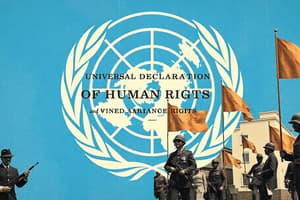Podcast
Questions and Answers
What were some of the driving factors of World War II as mentioned in the text?
What were some of the driving factors of World War II as mentioned in the text?
- Political ideologies and territorial ambitions (correct)
- Economic cooperation and social reforms
- Technological advancements and humanitarian efforts
- Religious conflicts and colonial disputes
What was one significant role played by China during World War II?
What was one significant role played by China during World War II?
- Playing a significant role in resisting Japanese aggression throughout Asia (correct)
- Being neutral in the conflict
- Supporting the German war effort
- Leading the Axis powers
Which countries were part of the Allied powers during World War II?
Which countries were part of the Allied powers during World War II?
- Germany, Italy, Japan
- Japan, China, Soviet Union
- Great Britain, France, Soviet Union (correct)
- United States, China, Italy
How did World War II impact societies around the world?
How did World War II impact societies around the world?
What major international organization was formed in the aftermath of World War II?
What major international organization was formed in the aftermath of World War II?
What was one of the most impactful side effects of WWII mentioned in the text?
What was one of the most impactful side effects of WWII mentioned in the text?
Which minority groups were targeted in the Holocaust?
Which minority groups were targeted in the Holocaust?
What key elements were included in the UN Charter?
What key elements were included in the UN Charter?
What did world leaders recognize as necessary after six years of WWII?
What did world leaders recognize as necessary after six years of WWII?
What is an ongoing challenge faced by the UN according to the text?
What is an ongoing challenge faced by the UN according to the text?
Flashcards are hidden until you start studying
Study Notes
History and Civics: World War II and the UN's Formative Years
World War II ushered in profound changes for global politics, economy, and society, shaping our understanding of history and civic engagement. This essay will delve into two key aspects of this era—the devastating conflict itself and its aftermath, when nations came together to form the United Nations (UN) —and how these events have influenced contemporary societies, including the importance they hold in modern civil education.
World War II: A Global Conflict with Local Consequences
From 1939 until 1945, nations around the world were engulfed by one of humanity’s most destructive conflicts. World War II was driven largely by political ideologies, territorial ambitions, ethnic tensions, and economic rivalries. It resulted in unprecedented loss of life, widespread destruction, and lasting repercussions on every continent.
The war saw some of the deadliest battles waged across land, sea, air, and even space, as nations fought over resources, territory, political influence, and influence within the international community. Among the belligerents were Germany, Italy, Japan, and their allies against the Allied powers led predominantly by Great Britain, France, the Soviet Union, and later the United States. China also played a significant role in resisting Japanese aggression throughout Asia.
One of the most impactful side effects of WWII was the Holocaust, a systematic genocide perpetrated by Nazi Germany against Jews, Roma Gypsies, homosexuals, people with disabilities, and other minorities deemed inferior under National Socialist doctrine. An estimated six million Jewish lives perished during this period along with millions more from various minority groups. In addition to the tragic human cost, the conflict brought about massive infrastructure damage, displacement of populations, and deepening economic divisions between countries.
The United Nations: Rebuilding Peace and Security Together
After six years of suffering and carnage, world leaders recognized the need for stronger international cooperation and collective security mechanisms if such catastrophes were ever to be prevented again. On October 24, 1945, delegates representing fifty United Nations met in San Francisco to sign the UN Charter, thus officially establishing the organization aimed at promoting peace, security, development, democracy, human rights, freedom, and the rule of law worldwide.
Key elements of the UN Charter included the promotion of peaceful resolution of disputes through negotiation, mediation, diplomacy, and, if necessary, collective action under Chapter VII; support for decolonization processes leading to self-determination and sovereignty for all peoples; commitment to uphold international law; advocacy for human rights, equality, and social justice; and encouragement for sustainable socioeconomic development.
Throughout their existence, the UN and its specialized agencies have undertaken numerous efforts to prevent future wars, address threats posed to international peace and security, mitigate environmental crises, protect human dignity and fundamental freedoms, promote sustainable development, and foster cross-border cooperation among member states. However, challenges remain and continue to shape debates among scholars, policy analysts, and civic activists alike regarding issues like climate change, refugee flows, nuclear proliferation, terrorism, and interstate relations.
History and Civic Education Today
Understanding the events and impacts of World War II is essential in developing critical thinking skills, empathy, and respect for diverse perspectives crucial in building inclusive societies. Learning about the experiences of individuals caught within the maelstrom allows students to recognize the consequences of intolerance, identify signs of fascism, and appreciate the sacrifices made in pursuit of democracy, human dignity, and universal rights while fostering curiosity about the complexities involved in maintaining global order today.
Similarly, comprehending the formation and purposes of the United Nations provides insight into the principles and values upon which it operates, offering opportunities to engage with current international affairs, learn about different cultural viewpoints and political systems, and explore potential career paths and civic engagement avenues related to global issues. Moreover, studying the evolution of the UN can inspire students to consider ways in which they might contribute to positive transformation both locally and globally.
In closing, recognizing the power of historical knowledge and its intersection with civic responsibility empowers citizens to become more informed participants in democratic discourse and equips them with tools needed to navigate the increasingly complex global landscape. By examining the past, we can better understand the present, anticipate the future, and work toward a more just and peaceful world.
Studying That Suits You
Use AI to generate personalized quizzes and flashcards to suit your learning preferences.





